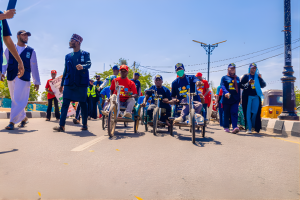Nigeria, WHO and Partners Reaffirm Commitment to End All Forms of Polio by 2030
Abuja, Nigeria, in collaboration with WHO and other partners, is intensifying efforts to eradicate all forms of polio by 2030 through government leadership, community engagement, and targeted vaccination campaigns.
Renewed Commitment on World Polio Day
Every year on 24 October, the global community reaffirms its commitment to eradicating poliomyelitis—a disease that can cause paralysis and, in some cases, death.
Although Nigeria successfully eradicated wild poliovirus in 2020, the experiences of survivors like Hassana Mohammed Bunur from Borno State serve as a reminder of the remaining challenge: eliminating circulating variant poliovirus type 2 (cVPV2), which still exists in parts of the country.
For Hassana Mohammed Bunur and Bukar Modu—both polio survivors—the fight to end polio is deeply personal. Hassana, who contracted the disease as a toddler, now uses a wheelchair and champions vaccination in her community. Bukar, 45, reflects,
“Had I been vaccinated; my life would be very different. But I can use my voice to protect others.”
Their experiences highlight the importance of immunisation and the power of advocacy in building a polio-free future.
Government Leadership Sustaining Progress
The Government of Nigeria, through the Federal Ministry of Health and Social Welfare (FMOH) and the National Primary Health Care Development Agency (NPHCDA), continues to demonstrate strong leadership in sustaining polio eradication gains.
Nigeria remains committed to halting all poliovirus transmission by 2030, investing in surveillance, routine immunisation, and supplementary immunisation activities (SIAs). Polio vaccination has been integrated with broader health initiatives through campaigns and community outreach to reach all eligible children.
The 2025 Measles–Rubella and Polio Vaccination Campaign aims to immunise over 106 million children, making it one of Africa’s largest immunisation efforts.
Eradicating All Forms of the Virus
While Nigeria remains free of wild poliovirus, cVPV2 cases persist. According to national surveillance data: As of 20 October 2024, 112 cases were recorded across 15 states.
In the same period in 2025, 66 cVPV2 cases were reported from 44 LGAs in 12 states—a 41% reduction, indicating progress in interrupting transmission.
Collective Commitment and Partner Support
WHO, in collaboration with national and international partners under the Global Polio Eradication Initiative (GPEI), supports Nigeria’s eradication efforts through:
• Technical assistance for planning and executing immunisation campaigns
• Logistical coordination to deliver vaccines to hard-to-reach areas
• Capacity-building for health workers in surveillance and outbreak response
• Data review mechanisms to identify gaps and guide corrective actions, including redeploying vaccination teams to missed settlements, strengthening social mobilisation, adjusting supply chains, and conducting targeted mop-ups to ensure no child is left behind
These efforts are complemented by partners including Rotary International, the Gates Foundation, Chigari Foundation, UNICEF, and others, who contribute to microplanning, social mobilisation, surveillance, and evidence-based decision-making.
Community Engagement Across States
Across Nigeria, WHO state offices joined government agencies, partners, and communities in commemorating World Polio Day, renewing advocacy for vaccination and stronger surveillance.
In Taraba State, the Commissioner of Health, Dr. Buma Bordiya, emphasized the state’s commitment during a press briefing in Jalingo:
“On World Polio Day 2025, we renew our collective commitment to reach every child, with every vaccine, everywhere—until polio is gone for good.”
• In Taraba State, over 2.3 million children received at least one dose of the polio vaccine during April and June SIAs.
• In Gombe, a 3 km awareness walk was held in collaboration with NYSC, Rotary, and others.
• In Ebonyi, the Commissioner of Health expressed gratitude to the Government of Nigeria, WHO, and partners for supporting child vaccination.
• In Kano, over 500 participants—including health officials, traditional leaders, and polio survivors—attended a commemorative event. The Chairman of the Polio Survivors Association urged continued advocacy and inclusion of survivors in outreach efforts.
Other states including Kwara, Kebbi, Kaduna, and Zamfara held similar events to reaffirm their commitment to reaching every child.
A Future Without Polio
For Hassana and other polio survivors, the fight against polio is deeply personal.
“If I had been vaccinated, my life would be very different,” reflects Bukar Modu, a 45-year-old polio survivor. “But I can use my voice to make sure no other child suffers as I did. Polio is still a threat, but vaccines save lives.”
Reaffirming WHO’s continued support, Dr. Kofi Boateng, Polio Eradication Programme Cluster Lead, emphasized:
“The only reason the poliovirus continues to circulate is because some children remain unvaccinated. The vaccine is safe and effective, and every child must be protected.”
Staying the Course and Taking Action
Nigeria’s strong government leadership, community resilience, and sustained partner collaboration are ensuring the country remains firmly on course toward a polio-free future by 2030—one where every child, everywhere, is protected.
To achieve this goal, continued community participation, timely vaccination, and coordinated efforts from all stakeholders are essential. Every caregiver, health worker, and partner has a role to play in ending polio for good.



